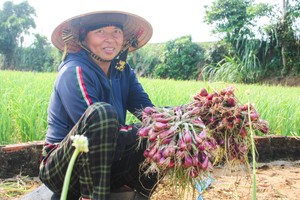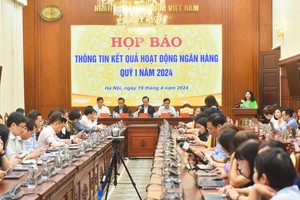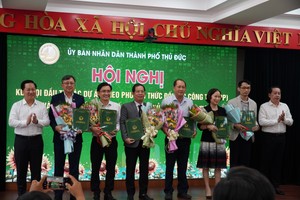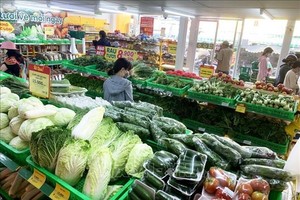
Accelerating the transformation of the management model
At a survey on waste management in HCMC by the National Assembly's Committee on Science, Technology, and Environment, Mr. Vo Van Hoan, Vice Chairman of the municipal People's Committee, said that the average population of the city increases by 200,000 people every year. Accordingly, the amount of urban waste also surges by 10-15 percent per year. Therefore, from 2019, the People's Committee of HCMC has assigned districts to organize and rearrange the people-founded garbage collection force. Accordingly, they have transformed the people-founded garbage collection model into a cooperative or an enterprise with legal status, combined with replacing new equipment for garbage collection.
Statistics from districts show that Thu Duc City and 19 out of 21 districts have completed the transformation of the people-founded garbage collection force into cooperatives or enterprises with legal status. The two districts that have not completed the transformation are Tan Phu District (95 percent) and District 5 (39.7 percent). However, the replacement of new garbage collection equipment for the people-founded garbage collection force has encountered many difficulties.
Ms. Nguyen Thi Thanh My, Deputy Director of the Department of Natural Resources and Environment of HCMC, said that currently, the Environmental Protection Fund has appraised documents and disbursed to support units in changing new vehicles with a total amount of VND70 billion. The remaining number of proposals to support the transformation is waiting for funding. However, with more than 2,000 old vehicles that need to be replaced, it is really difficult and will need a long-term roadmap or a huge budget from the State.
As for waste treatment, the city has issued a policy to invest in four projects to convert to waste-to-energy technology for four enterprises, including Vietstar Joint Stock Company with a capacity of 2,000 tons per day, Tam Sinh Nghia Investment and Development Joint Stock Company with a capacity of 2,000 tons per day, Tasco Cu Chi Environment Joint Stock Company with a capacity of 500 tons per day, and Vietnam Waste Treatment Company Limited with a capacity of 3,000 tons per day.
At the same time, the People's Committee of HCMC has directed the Department of Planning and Investment to coordinate with relevant departments and agencies to develop a common process for bidding and selecting investors to carry out investment projects in the form of public-private partnership (PPP) to serve as a basis for the implementation of waste treatment projects. However, most of these projects are carried out extremely slowly and possibly fail to meet the target of domestic solid waste treatment rate by waste-to-power and recycling technologies as set out in the roadmap.
Eliminating sluggish investors
From the perspective of an enterprise, a representative of HCMC Urban Environment One Member Limited Liability Company said it is necessary to speed up the administrative procedure reform related to investment licensing for waste treatment projects so that capable investors can participate in waste treatment activities early. The investment licensing or transformation of waste treatment technology should not be limited to only a few enterprises but should be expanded for many enterprises to join. The matter is that the city creates an open mechanism in the direction that the investor who puts the plant into operation first will be allocated a corresponding volume of garbage to its operating capacity for treatment.
This is the only way to avoid the situation where some investors get investment licenses to build waste-to-energy plants, but they procrastinate and do not carry out their projects, while other enterprises want to do it but are not licensed. As a result, the city will face a waste crisis because there is no more land fund for dumping sites.
From the management perspective, Ms. Nguyen Thi Thanh My said that to implement synchronously and conveniently the management of waste collection, transportation, and treatment in HCMC, the People's Committee of HCMC should propose central ministries and agencies to soon remove many existing problems. Specifically, the Ministry of Construction will soon review and approve a specialized planning project on the environment and submit it to the Prime Minister for consideration and approval.
Previously, in September 2021, the People's Committee of HCMC submitted a planning project to the Ministry of Construction but has not received a response so far.
As for the Ministry of Natural Resource and Environment, it is necessary to soon issue regulations on economic and technical norms for the collection, transportation, and treatment of domestic solid waste so as not to obstruct waste management activities in general.
Regarding the price issue, according to Ms. Nguyen Thi Thanh My, relevant ministries and agencies need to coordinate in reviewing and unifying in promulgating regulations on the prices of solid waste collection, transportation, and treatment services, avoiding overlapping in setting prices between ministries, central agencies, and People's Committees of provinces and cities.
As for the legal issue in pricing for waste treatment, ministries and agencies should soon develop and announce the investment capital and cost of domestic solid waste treatment for waste incineration technology to generate electricity as a basis to apply and organize bidding to select investors according to regulations.
On the other hand, the Ministry of Industry and Trade should soon add waste-to-energy projects in the city to the national plan for the development of power sources using solid waste so that investors can quickly complete the necessary legal procedures and start construction of the waste-to-power plants in 2022.
As for ordering and bidding for the provision of public services in the field of domestic solid waste treatment, ministries and agencies shall consider and remove legal procedures so that the city can place orders for the additional volume of solid waste of units that are contracted to treat the city's waste but switch to technology with a higher capacity than the signed capacity under the contract.
At the same time, for the extra volume generated by the city, the municipal People's Committee is entitled to organize a tender to provide public services without having to carry out under the form of PPP.
























